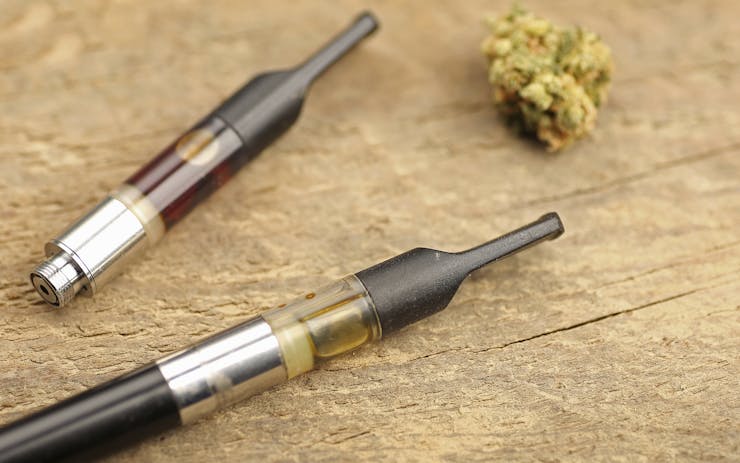By now, you’ve probably seen or tried firsthand a vaporizer with an oil cartridge. These portable vaporizers are becoming increasingly popular as they’re easy to dose and operate. Visiting a dispensary, you’ll notice different brands made with different strains, solvents, and additives. Which ingredients are safe, and which ones should be avoided?
Burning cannabis oils can produce some of the same free radicals that are formed when you burn cannabis or tobacco, which is why people have turned to vaporizing (vaping). Vaporizing means that cannabis is heated without combustion. Active ingredients are released by the heat into a fine-mist vapor. Since combustion does not occur, smoke is not created.
People who vape cannabis perceive vaping to be safer and less harmful to their health than smoking. Cannabis vaporizers are specifically designed for inhalation without harmful smoke toxins, but how safe are materials being inhaled?
Harmful agents to avoid in cannabis oil
When vaporized, cannabis oils are frequently mixed with thinning agents for better performance in a vaporizing device. However, when some thinning agents are heated, potentially harmful carbonyl compounds can be produced.
Carbonyls are a group of cancer-causing chemicals that includes formaldehyde, which has been linked to spontaneous abortions and low birth weight. A known thermal breakdown product of propylene glycol, formaldehyde is an International Agency for Research on Cancer group 1 carcinogen.
Research in this area first began with e-cigarettes. Cannabis and e-cigarettes use different thinning agents and are heated and vaporized at different temperatures, but there are parallels that have now led researchers to begin similar research on cannabis thinning agents.
However, there is no research regarding heating of thinning agents in vaporizing devices specifically designed for cannabis. Most research of this nature has been done on e-cigarettes, which have been around for nearly a decade. One of the first studies was a 2015 study in the New England Journal of Medicine that showed hidden formaldehyde in the aerosols of e-cigarettes.
In a very recent* August 2017 study, a team of researchers summarized the e-cigarette pulmonary toxicity by looking at human studies, animal models and cell culture studies. They described the field of research as rapidly evolving and identified research gaps and challenges, but warned that when heated to high temperatures, propylene glycol can break down into microscopic polymers that can cause damage to lung tissue.
Another 2017 study conducted at the Medical Marijuana Research Institute in Arizona, researchers looked at the byproducts produced when vaporizing cannabis oil. These popular cannabis thinning agents were studied:
- Propylene glycol (PG or PPG)
- Vegetable glycerin
- Polyethylene glycol (PEG) 400
- Medium chain triglycerides
These thinning agents were heated to 230°C (450°F), and scientists tested the resulting vapors to detect the presence of harmful compounds like formaldehyde, acetaldehyde, and acrolein.
The results showed that polyethylene glycol 400 produced much higher acetaldehyde and formaldehyde byproducts than the other three agents. Heating of the thinning agent propylene glycol also produced significantly greater formaldehyde byproduct. Researchers concluded that individuals who vaporize cannabis oil utilizing these thinning agents may risk harmful exposures to the byproducts.
Furthermore, there has been a lack of adequate safety testing for the vape pen devices. Pre-packaged oil cartridges are not well labeled in some cases, and thinning agents are frequently developed in countries that have no regulatory controls. There are many vape pens on the market, all of which have a different heating source with different activation and temperature.
But is there conclusive evidence that vape pen consumers will develop pulmonary illnesses or cancers? No. Very little is known about either short- or long-term effects of inhalation of thinning agents like propylene glycol and others.
Thinning agent alternatives in vaporizer cartridges
Producers of vaporizer cartridges are making a mass exodus away from these thinning agents due to their health risks and the unpleasant taste they tend to carry. Instead, many are turning to terpenes as they help thin the oil while improving flavor. Others are using different extraction methods such as CO2 extraction to achieve an oil thin enough to be consumed in a cartridge without the need for additive thinners.
As vaporizing oil cartridges becomes more popular, products specifically designed for this purpose are emerging in the marketplace. When purchasing oil cartridges for your portable vaporizer, check the ingredients to see if propylene glycol and/or polyethylene glycol 400 are listed. If so, you may want to avoid them and reach for an alternative product that utilizes terpenes or more health-conscious thinning agents.
*Update 8/22/17: Since the original publication of this article, a new study from the American Physiological Society on pulmonary toxicity was released. It has since been added to this article’s analysis.






